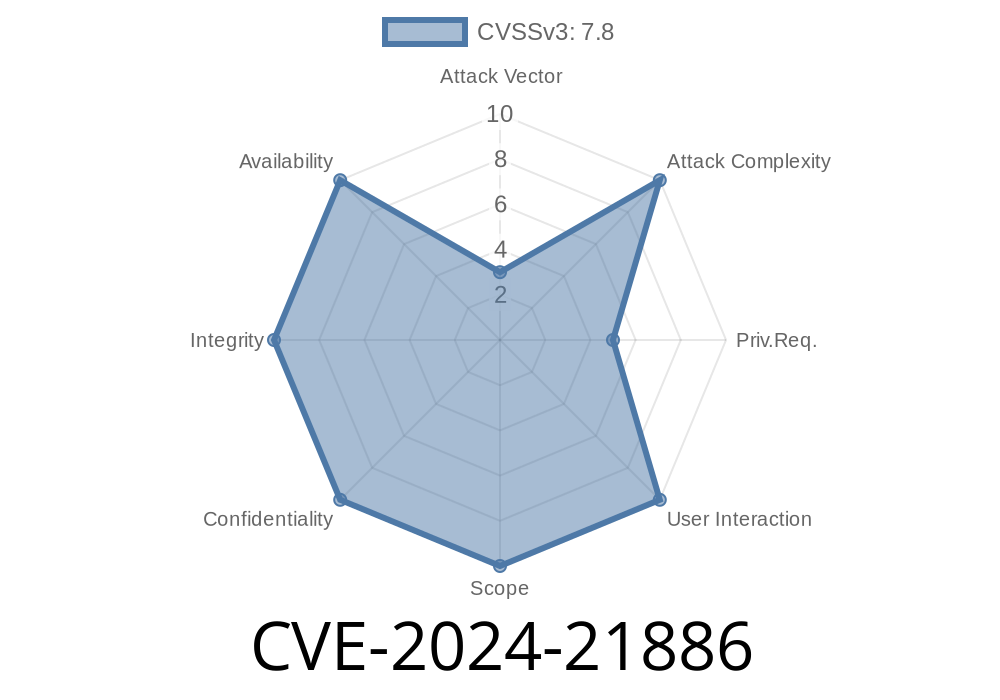In early 2024, security researchers uncovered a critical vulnerability affecting the X.Org Server, the backbone of graphical displays on many Unix-like operating systems. Registered as CVE-2024-21886, this flaw occurs in the DisableDevice function and arises from a heap buffer overflow. If exploited, it can crash applications, and, in certain SSH X11 forwarding setups, let a remote attacker execute arbitrary code on the target machine. This post unpacks the vulnerability, shows a simplified version of the exploit, and provides guidance to keep your systems safe.
What is the X.Org Server?
The X.Org Server is the standard display server for most Linux distributions. It handles displaying windows, managing user input (mouse, keyboard), and communicating with hardware drivers.
About the Vulnerability
CVE-2024-21886 is a heap buffer overflow in the DisableDevice function in X.Org. The problem occurs when the function mishandles device list operations (like detaching an input device), causing it to write outside the bounds of a memory buffer.
Crash: The server (or app) can crash due to memory corruption.
- Remote Code Execution: On systems where SSH X11 forwarding is active (ssh -X or ssh -Y), a malicious user can potentially run code with the privileges of the X server user (usually your desktop session).
- Local Privilege Escalation: On desktop setups where X.Org still runs as root, a local attacker on the same machine may get root privileges.
Digging Into the Code
Let’s look at a simplified extract that demonstrates the buggy logic (based on public info and patches):
// Vulnerable pseudocode
void DisableDevice(DevicePtr dev) {
int n = dev->numClasses; // Number of input classes
InputClassPtr classes = dev->classes; // Input classes array
// ... Some code ...
for (int i = ; i <= n; i++) { // Oops! Off-by-one error!
RemoveInputClass(classes[i]);
}
}
What’s Wrong Here?
Notice the for loop iterates until i <= n; in C programming, arrays are -indexed, so valid indices run from to n-1. By including n, the code accesses memory it doesn’t own (classes[n]), causing a heap buffer overflow.
Many sysadmins use SSH X11 forwarding to run graphical apps over secure connections
ssh -X username@server.com
# or
ssh -Y username@server.com
Example Exploit Skeleton (Python with xpyb)
from xpybutil import conn
# Skeleton: trigger input device detach
# Would need low-level binary protocol knowledge to trigger in practice
# Send crafted message (simplified pseudocode)
conn.core.FakeInput(...)
# Monitor for crash or abnormal X server behavior
NOTE: Real exploits require deep X11 protocol understanding and tailored heap grooming.
Most desktop Linux distributions using X.Org are affected if not patched.
- Systems using Wayland or XWayland may have different risk surfaces, but many legacy or remote-troubleshooting systems still expose X.Org.
Update your X.Org server packages immediately!
- Debian/Ubuntu:
sudo apt upgrade xserver-xorg-core
- Fedora/RedHat:
bash
sudo dnf upgrade xorg-x11-server-Xorg
`
---
## References and Further Reading
- X.Org security advisory: CVE-2024-21886, CVE-2024-21887
- MITRE CVE entry for CVE-2024-21886
- Red Hat Security Bulletin
- Debian Security Tracker
- Technical analysis and patch
---
## Conclusion
CVE-2024-21886 brings to light the ongoing risks in older, widely-used code like the X.Org server. If you use X11 forwarding over SSH, or manage older desktop environments, keeping your systems patched is essential. Consider migrating to newer display technologies (like Wayland) for improved security. Always treat X servers as high-value targets—limit user access, use strict SSH controls, and stay updated on security news.
Stay safe, and keep your systems secure!
Timeline
Published on: 02/28/2024 13:15:08 UTC
Last modified on: 02/28/2024 14:06:45 UTC
